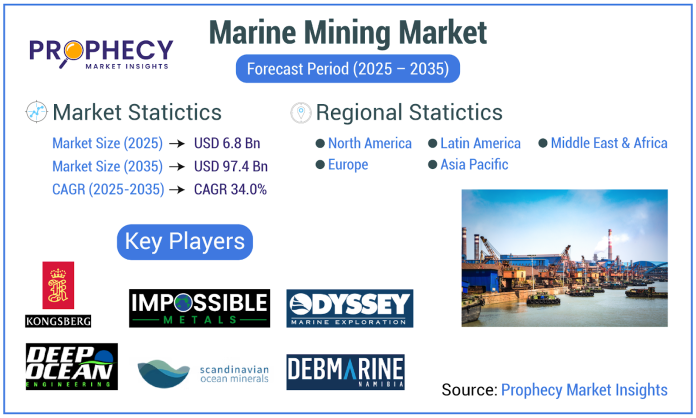Marine mining involves the extraction of valuable minerals and natural resources from oceanic environments. This practice ranges from near-shore operations, where materials like sand, gravel, and salt are harvested, to deeper waters that hold oil, natural gas, and strategically important metals such as manganese and cobalt.
As the demand for construction materials, energy resources, and strategic metals grows, marine mining market is gaining attention. However, environmental concerns and regulatory challenges accompany these advancements.
Key Growth Drivers and Opportunities
Increasing Demand for Minerals and Metals: Cobalt, nickel, and manganese, crucial for EV batteries and renewable energy technologies, are abundant in deep-sea nodules. Rising demand for metals and minerals, especially those needed for renewable energy and technological innovations such as electric vehicles. As land-based mineral reserves run out, the ocean floor offers a huge, unexplored supply of these vital resources, which forces industries to look into marine mining as a possible way to meet the rising demand.
Growing Investment in Offshore Mining Technologies: Enhanced investment in offshore mining technology will transform the livelihoods of those affected by ocean degradation. Seabed mapping, AI-controlled navigation, and pressure-resistant robotic arm innovations allow for accurate resource extraction while minimizing environmental hazards at the same time. The surge in R& D and capital investments not only speeds up commercialization time planning but also generates interest in the clean energy, defense, and telecommunications industries.
Challenges
Deep-sea mining requires specialized vessels, submersibles, pumps, and AI-driven navigation all extremely expensive. Environmental concerns such as sediment plumes, disruption of biodiversity, and noise pollution affecting marine life this factors hamper the growth of marine mining market growth.
Innovation and Expansion
India’s Deep Sea Mining Trials
On October4, 2024, The Deep Sea Mining Group of the National Institute of Ocean Technology (NIOT) has successfully conducted exploratory mining trials for polymetallic nodules in the Andaman Sea, utilizing a specially designed seabed mining machine named Varaha-3. The locations for these trials were previously surveyed and identified by the Geological Survey of India, highlighting the potential for valuable mineral resources beneath the ocean floor.
The Government of India Submits Two Applications for Approval of Plans of Work for Seabed Exploration in the Indian Ocean
On 18 January 2024, the Government of India submitted two applications to the International Seabed Authority (ISA) for approval of two plans of work for exploration in the international seabed area (the Area) of the Indian Ocean. One application has been submitted for the exploration for polymetallic sulphides in the Indian Ocean Ridge (Carlsberg Ridge). The second application was submitted for the exploration for cobalt-rich ferromanganese crusts of the Afanasy-Nikitin Seamount in the Central Indian Ocean.
IAI unveils BlueWhale Large Autonomous Underwater Vehicle (AUV)
In May 2023, Israeli Aerospace Industries (IAI), announced expansion of its maritime capabilities and presenting its BlueWhale Large Autonomous Underwater Vehicle for the first time. This has successfully undergone thousands of autonomous operation hours, including intelligence-gathering for both maritime and coastal targets, acoustic intelligence, and identifying the presence of naval mines. The autonomous submarine can perform a significant portion of the operations of a manned submarine, for periods of several weeks, at minimal cost and maintenance, without the need for operators on board.
India Launches Deep-Sea Mining Project to Develop ‘Blue Economy’
In January 2023, India launched a deep-sea mining project which was a type of marine mining to fulfill the need for rare minerals. With a budget of more than USD 460 million over five years, the initiative would develop deep-sea mining technologies and resource exploration, study marine biodiversity, purchase a research vessel for ocean exploration and conduct research on ocean climate change.
The Metals Company Acquires Third Seabed Contract Area to Explore For Polymetallic Nodules
In April 2020, The Metals Company, announced that it has acquired Tonga Offshore Mining Limited (TOML), giving the company exploration rights to a 74,713 km2 block of CCZ seabed that contains an inferred resource of 756 million wet tonnes of polymetallic nodules. The acquisition expands The Metals Company’s extensive library of CCZ deep-sea data, with 10,450 preserved biological samples, 3,153 line-kilometers of seabed images and 115,591 square kilometers of high-resolution bathymetric data
About Author:
Prophecy is a specialized market research, analytics, marketing and business strategy, and solutions company that offer strategic and tactical support to clients for making well-informed business decisions and to identify and achieve high value opportunities in the target business area. Also, we help our client to address business challenges and provide best possible solutions to overcome them and transform their business.


